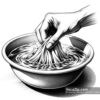imaginary meaning
imaginary :
not real, made up
adjective
▪ She has an imaginary friend.
▪ She has a friend that is not real.
▪ The story is about an imaginary world.
▪ The story is about a world that is not real.
paraphrasing
▪ fictional – not real
▪ pretend – made up
▪ unreal – not real
▪ invented – made up

Pronunciation
imaginary [ɪˈmædʒɪˌnɛri]
The stress is on 'mag' and sounds like 'ih-maj-uh-nair-ee'.
Common phrases and grammar about imaginary
imaginary - Common meaning
adjective
not real, made up
Part of Speech Changes for "imaginary"
▪ imagination (noun) – the ability to create ideas in the mind
▪ imagine (verb) – to think of something not real
▪ imaginative (adjective) – creative, full of new ideas
Common Expressions with "imaginary"
▪ imaginary friend – a friend that is not real
▪ imaginary world – a world that is not real
▪ imaginary line – a line that is not real, used in maps
▪ imaginary situation – a situation that is not real
Important examples of imaginary in TOEIC
Vocabulary examples from the TOEIC test
In TOEIC vocabulary questions, imaginary is often used to describe things that are not real or exist only in the mind.
Example of a confusing word: imaginative (creative)
Grammar examples from the TOEIC test
As an adjective, imaginary often describes nouns that are not real, appearing in TOEIC grammar questions.
imaginary
Idioms and fixed expressions in TOEIC
imaginary number
'a number that is not real', used in mathematics.
flights of fancy
means 'ideas that are not real', used to describe imaginary thoughts.
Differences between similar words and imaginary
imaginary
,
fictional
differences
Imaginary refers to things that are made up in the mind, while fictional refers to things made up in stories or literature.
Words with the same origin as imaginary
The origin of imaginary
The word's etymology is not clear.
Word structure
The analysis of the word's composition is unclear.
Words with the same origin
The word's root is unclear or difficult to confirm.






